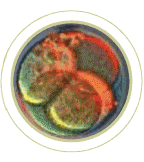

 |
||||
|
|
||||
|
|
|
Faculty Professor Hazel Sive, WI401C; sive [at] wi.mit.edu, 8-8242, and guest speakers
Format of the Class: The course is divided into multiple topics, each of which will be covered by two hours of lecture and two hours of discussion of research papers. In some cases, guest lecturers working in a specific area will teach a topic. One review article and one research paper will be handed out one week ahead of time and will be relevant to that week’s lecture topic. Groups of students will be responsible for leading discussion of research papers. Instruction on how to structure these discussions will be given. Another emphasis of the course is to teach you how to experimentally approach the topics of development. Emphasis will be on hypothesis-driven research approaches. Students will become conversant with cutting edge molecular, genetic and imaging techniques that are applicable to analysis of many aspects of development. Since development is a three (and four) dimensional subject, modeling materials will be used in some sessions. Discussions will include current news relevant to the lecture material. An optional additional discussion module using the book “Jurassic Park” as a tool to approach ethical and experimental issues in developmental biology research will be offered.
Text However, Developmental Biology, 8th edition, by Scott Gilbert (published by Sinauer) is a very useful text, and recommended. Selected readings from this book will be suggested for some topics. Another useful and less dense book I recommend is Essential Developmental Biology 2nd edition, by Jonathan Slack (published by Blackwell).
WEEKLY PAPER DISCUSSIONS Guidelines on how to read papers (see below) and to present material will be discussed. Leading the discussion will involve preparing powerpoint slides of each figure in the papers, as well as supplemental material. Leaders can organize the discussion as they wish, however this must include getting the rest of the class to participate! Everyone is expected to have read the papers, and be able to discuss them, including being able to explain the questions, hypotheses, methodology including controls, results and interpretation behind each experiment presented in the figures and tables. All students are encouraged to discuss papers prior to class, as understanding the literature is best done collaboratively.
reading research papers – some guidelines In reading papers, it is useful to ask the following:
course requirements Attendance at all classes, active participation in class, and leading discussions as assigned is expected, as well as completion of the final project (below). For undergraduates, the course can only be taken pass/fail and therefore cannot count as a restricted elective. Questions are encouraged in both lecture and paper review sessions. Naïve questions are encouraged and no question will be considered stupid. It is also expected that you will have read and considered all papers before the discussion session. You will be asked to keep a written record of techniques relevant to specific questions as the course proceeds. This compendium of techniques will serve as a useful future reference. FINAL PROJECT
Your review and compilation is due on Friday December 15, by 4pm (in Prof. Sive's office, Whitehead 401C), in hard copy and by midnight, electronically. PAPER REVIEW Please organize the review clearly, into the following sections.
Finally, you will need to propose one further experiment you feel would best extend the study described (~4 pages).
|
|
|
|
||